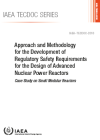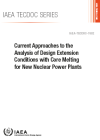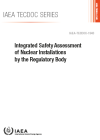The Safety Assessment Section (SAS) helps to improve the capability and capacity of Member States in carrying out effective safety assessments and enhancing the safety of nuclear installations. The SAS does this by developing safety standards and guides for design and safety assessment at nuclear installations; by promoting the use of advanced safety assessment methods and tools with enhanced integration of deterministic and probabilistic analyses and by using risk-informed and performance-based safety approaches.
Safety Assessment Section
The SAS undertakes Technical Safety Reviews (TSRs) that can be tailored to the needs of the requesting IAEA Member States. The work of the Section covers current, evolutionary and innovative reactors, including small modular reactors (SMRs), non-water-cooled reactors and fusion reactors. The SAS promotes the use of state-of-the-art safety assessment methods and tools and encourages the exchange of information, coordination of programmes, and cooperation with recognised international organisations. The SAS shares information about its work through the Global Nuclear Safety Assessment Network (GSAN).
Developing standards and supporting documents for design safety and safety assessment
The Section develops a broad range of safety standards related to the design safety of nuclear power plants and the safety assessment of facilities and activities to ensure that all aspects of nuclear safety are addressed in an integrated manner. The safety standards are developed together with an international team of senior experts by means of an open, transparent, and consensus-driven process that integrates safety knowledge and best practices from Member States.
A significant part of the SAS work is the development of technical publications on design safety and safety assessment providing examples and good practices on the wide range of topics covered by the Section.
In addition, the SAS coordinates the holistic approach to Safety, Security and Safeguards by design (3S) across relevant IAEA teams, fostering consideration of the interfaces and synergies between the three disciplines.
Conducting Technical Safety Peer Reviews
To address Member States specific needs for independent safety evaluation at most stages of development and deployment of nuclear power programmes’ life-cycle, the Section provides Technical Safety Review (TSR) services, a tailored independent international peer-review evaluation of plant design safety and safety assessment based on IAEA Safety Standards. The TSR covers the following subject areas:
- Design Safety (DS)
- Generic Reactor Safety (GRS)
- Safety Requirements (SR)
- Probabilistic Safety Assessment (PSR)
- Accident Management (AM)
- Periodic Safety Review (PSR)
These TSR services are also offered to address specific technical aspects, such as plant modifications or the development of regulatory safety requirements. The TSR streamlines and integrates the earlier peer-review services of the IAEA, such as the . Design Safety Review Service (DSRS), Technical Safety Review of Generic Reactor Safety (TSR-GSR), International Probabilistic Safety Assessment Review Team, (IPSART), and the Review of Accident Management Programme (RAMP).. The TSR review concludes with a final report issued by the IAEA to the requesting Member State, which includes recommendations for enhancements and improvements to safety.
Capacity building on design safety and safety assessment
The Section maintains the Global Nuclear Safety Assessment Network (GSAN), which is part of the Global Nuclear Safety and Security Network (GNSSN) and requires registration. It connects experts worldwide and facilitates focused collaboration on the development of Safety Standards and other technical guidance documents as well as a platform to share relevant information on technical and consultancy meetings with international participants.
GSAN also hosts safety assessment competency-building materials in support of global implementation of the IAEA Safety Standards, with the intent to expand and develop nuclear programmes globally and hosts a variety of international, regional, and national training courses and workshops in the area of plant design safety and safety assessment of current, evolutionary, and innovative reactors.








